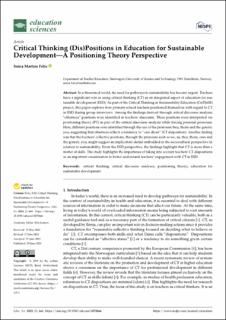| dc.contributor.author | Martins Felix, Sonia | |
| dc.date.accessioned | 2023-08-16T09:08:22Z | |
| dc.date.available | 2023-08-16T09:08:22Z | |
| dc.date.created | 2023-06-29T14:27:12Z | |
| dc.date.issued | 2023 | |
| dc.identifier.citation | Education Sciences. 2023, . | en_US |
| dc.identifier.issn | 2227-7102 | |
| dc.identifier.uri | https://hdl.handle.net/11250/3084346 | |
| dc.description.abstract | In a threatened world, the need for pathways to sustainability has become urgent. Teachers have a significant role in using critical thinking (CT) as an integrated aspect of education for sustainable development (ESD). As part of the Critical Thinking in Sustainability Education (CriThiSE) project, this paper explores how primary school teachers positioned themselves with regard to CT in ESD during group interviews. Among the findings derived through critical discourse analysis, “otherness” positions were identified in teachers’ discourse. These positions were interpreted via positioning theory (PT) as part of the critical discourse analysis while tracing personal pronouns. Here, different positions were identified through the use of the pronouns they, theirs and the generic you, suggesting that otherness reflects a tendency to “care about” (CT disposition). Another finding was that the teachers’ collective positions, through the pronouns such as we, us, they, theirs, ours and the generic you, might suggest an implicatory denial embedded in the sociocultural perspective in relation to sustainability. From the ESD perspective, the findings highlight that CT is more than a matter of skills. The study highlights the importance of taking into account teachers’ CT dispositions as an important consideration to better understand teachers’ engagement with CT in ESD. | en_US |
| dc.language.iso | eng | en_US |
| dc.publisher | MDPI | en_US |
| dc.rights | Navngivelse 4.0 Internasjonal | * |
| dc.rights.uri | http://creativecommons.org/licenses/by/4.0/deed.no | * |
| dc.title | Critical Thinking (Dis)Positions in Education for Sustainable Development—A Positioning Theory Perspective | en_US |
| dc.title.alternative | Critical Thinking (Dis)Positions in Education for Sustainable Development—A Positioning Theory Perspective | en_US |
| dc.type | Peer reviewed | en_US |
| dc.type | Journal article | en_US |
| dc.description.version | publishedVersion | en_US |
| dc.source.pagenumber | 12 | en_US |
| dc.source.journal | Education Sciences | en_US |
| dc.identifier.doi | https://doi.org/10.3390/educsci13070666 | |
| dc.identifier.cristin | 2159507 | |
| dc.relation.project | Norges forskningsråd: 302774 | en_US |
| cristin.ispublished | true | |
| cristin.fulltext | original | |
| cristin.qualitycode | 1 | |

